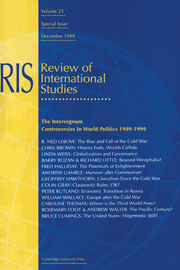Book contents
- Frontmatter
- Contents
- Acknowledgements
- Foreword
- Notes on contributors
- Introduction
- 1 The Rise and Fall of the Cold War in Comparative Perspective
- 2 History Ends, World Collide
- 3 Globalization and National Governance: Antinomies or Interdependence?
- 4 Beyond Westphalia?: Capitalism after the ‘Fall’
- 5 The Potentials of Enlightenment
- 6 Marxism after Communism
- 7 Liberalism Since the Cold War: An Enemy to Itself?
- 8 Clausewitz Rules, OK? The Future is the Past—with GPS
- 9 Mission Impossible? The IMF and the Failure of the Market Transition in Russia
- 10 Europe after the Cold War: Interstate Order or post-Sovereign Regional System?
- 11 Where is the Third World Now?
- 12 Whatever Happened to the Pacific Century?
- 13 Still the American Century
- Index
1 - The Rise and Fall of the Cold War in Comparative Perspective
Published online by Cambridge University Press: 05 November 2009
- Frontmatter
- Contents
- Acknowledgements
- Foreword
- Notes on contributors
- Introduction
- 1 The Rise and Fall of the Cold War in Comparative Perspective
- 2 History Ends, World Collide
- 3 Globalization and National Governance: Antinomies or Interdependence?
- 4 Beyond Westphalia?: Capitalism after the ‘Fall’
- 5 The Potentials of Enlightenment
- 6 Marxism after Communism
- 7 Liberalism Since the Cold War: An Enemy to Itself?
- 8 Clausewitz Rules, OK? The Future is the Past—with GPS
- 9 Mission Impossible? The IMF and the Failure of the Market Transition in Russia
- 10 Europe after the Cold War: Interstate Order or post-Sovereign Regional System?
- 11 Where is the Third World Now?
- 12 Whatever Happened to the Pacific Century?
- 13 Still the American Century
- Index
Summary
Introduction
Much of the discussion of the end of the Cold War starts from the premise that Gorbachev's domestic reforms and foreign policy initiatives set in motion a process that radically transformed the nature of East-West relations. The emphasis on the Gorbachev period is natural enough given the consensus among Western and Russian scholars that Gorbachev's domestic and foreign policies were the proximate cause of the end of the Cold War. The near exclusive focus on the causes and consequences of Gorbachev's policies nevertheless frames the analytical puzzle too narrowly. The Cold War was not a static conflict that continued unchanged from its origins in the late 1940s to the advent of Gorbachev some forty years later. Gorbachev's initiatives ushered in the terminal stage of a process of accommodation that had been underway, albeit with fits and starts, for several decades. The Gorbachev foreign policy revolution needs to be put into broader historical context.
To understand why the Cold War ended peacefully, it also needs to be compared to other war-threatening rivalries. Some of these rivalries also ended in peaceful accommodations. What, if anything, does the Cold War share in common with these conflicts? Do they reveal patterns that could help us better understand the Cold War, its dénoument and its broader lessons for conflict prevention and management?
I begin by describing the four generic explanations—structure, ideas, domestic politics and leaders—that have been advanced for the end of the Cold War.
- Type
- Chapter
- Information
- Publisher: Cambridge University PressPrint publication year: 2000

